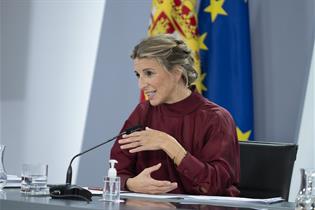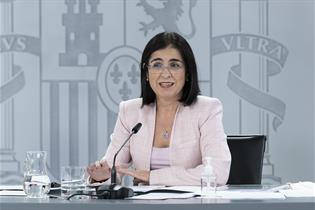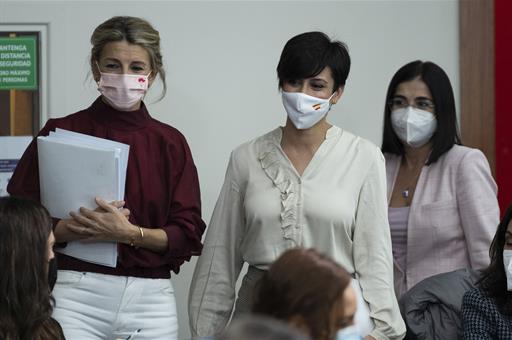Extraordinary Council of Ministers
The Government of Spain presents the reform of the Employment Law and the creation of the Spanish Employment Agency
Council of Ministers - 2021.12.3
Moncloa Palace, Madrid
The Council of Ministers has approved the Preliminary Draft Employment Law, the Spanish Active Employment Support Strategy 2021-2024 and the Annual Employment Policy Plan (PAPE) 2021.
The Second Vice-President of the Government of Spain and Minister for Work and Social Economy, Yolanda Díaz, framed the legislative reform within the Recovery, Transformation and Resilience Plan, specifically component 23 "New public policies for a dynamic, resilient and inclusive labour market", and pointed out that it responds to the recommendations made by the Independent Authority for Fiscal Responsibility (AIREF) and the European Commission, among other bodies. From today, the preliminary draft begins its ordinary processing until its approval as a bill and subsequent referral to Parliament.
The objectives of the regulation are to establish a framework for the organisation of public employment policies, to promote and develop the planning, coordination and execution of employment policy and to offer new tools to workers, unemployed and employed, and to companies, to improve the quality of employment, guidance and support.
Transformation of the SEPE into the Spanish Employment Agency
 Foto: Pool Moncloa/Borja Puig de la BellacasaThe vice-president highlighted the transformation of the current autonomous body Servicio Público de Empleo Estatal (SEPE) into a state agency called Agencia Española del Empleo, which will modernise its structure and digitalise all its operating systems to increase its speed, agility and flexibility.
Foto: Pool Moncloa/Borja Puig de la BellacasaThe vice-president highlighted the transformation of the current autonomous body Servicio Público de Empleo Estatal (SEPE) into a state agency called Agencia Española del Empleo, which will modernise its structure and digitalise all its operating systems to increase its speed, agility and flexibility.
The new public body will concentrate the design of employment policies and will do so subject to permanent evaluation by means of an annual audit to measure the success or failure of the measures deployed and, if necessary, to correct them.
The main characteristic of the Agency, Díaz pointed out, is that "it is no longer designed for the unemployed, but for Spanish society as a whole, workers, individuals and companies".
The incorporation of companies into the system, she continued, is an example of public-private partnership that will make it possible to better define employability policies: "It is almost impossible to get the guidance or the final procedure right, which is to hire someone, if we don't have the realities or specific needs of the companies at any given time, which are concentrated in very different parts of the country and which also have very different production models".
The Agency will also offer advice to all those who have a business project and, if it is viable, will support it with public resources.
Personalised attention
The future state agency, the services of the regional governments and the public employment services will have to offer a basic portfolio of services in terms of guidance, training, intermediation and counselling for employment, in order, according to Díaz, to have "a common minimum throughout the country".
Personalised attention and tutoring will be offered and each person will have a single digitalised employment file, like a health card, which will contain information on their qualifications, career path and professional experience, in order to improve labour intermediation and offer personalised advice and training actions.
On the other hand, the groups receiving priority attention are extended: young people, people with limited intellectual capacity and autism spectrum disorders, sexually or affectively diverse people, older people and migrants, beneficiaries or applicants for any form of international protection, women victims of sex-based violence, ethnic minorities and people who are undergoing restructuring processes, such as collective redundancies, or are affected by productive transformation processes, such as in the mining areas.
Fundamental principles
The vice-president summarised the principles inspiring the new regulation: non-discrimination, transparency in the functioning of the labour market and efficiency in the design and execution of employment policies.
Regarding the first, she stated that artificial intelligence will be used, as is already being done successfully by the Labour Inspectorate, to detect and correct discrimination in access to and consolidation of employment on the grounds of race, sex, religion or beliefs, age, functional diversity, political opinion, national origin or sexual orientation.
To improve transparency in the functioning of the labour market, the Employment Analysis Office will be established, which will centralise all labour market data. Both the administrations and the private employment agencies will be obliged to communicate them, with the aim, said Díaz, of being able to "know what offers are being made, in real time, throughout the country" and "carry out joint actions" in the different autonomous communities, adapted to their specific realities.
Efficiency in the design and implementation of employment policies will be strengthened by a change in the governance model. Thus, in active employment policies, local entities, together with the regional governments, will play an active role in order to gain in immediacy and proximity and achieve an optimal level of implementation throughout Spain.
Strategy 2021-2024 and Annual Plan
The Spanish Active Employment Support Strategy 2021-2024, which has been the subject of social dialogue and unanimously endorsed by all regional governments, as the vice-president stressed, forms the state benchmark framework for public employment services to design and manage their policies.
For its part, the Annual Employment Policy Plan (PAPE) includes around 2.111 billion euros for distribution among the regional governments, funds that are independent of those financed by the Recovery and Resilience Mechanism.
Mental Health Strategy 2022-2026
 Foto: Pool Moncloa/Borja Puig de la BellacasaThe Council of Ministers has approved the Mental Health Strategy for 2022-2026, unanimously agreed yesterday by the regional governments in the Interterritorial Council of the National Health System.
Foto: Pool Moncloa/Borja Puig de la BellacasaThe Council of Ministers has approved the Mental Health Strategy for 2022-2026, unanimously agreed yesterday by the regional governments in the Interterritorial Council of the National Health System.
The Minister for Health, Carolina Darias, has reiterated that the document responds to the Executive's commitment to improving people's lives: "The Government's determination is clear and that is to put mental health at the epicentre of public policy, because without mental health there is no health".
Darias insisted on the need to make it visible, especially after the impact that the COVID-19 epidemic has had on citizens and the health system. She also recalled that, according to World Health Organization forecasts, mental health problems will be the leading cause of disability by 2030.
The Executive has updated the strategy that has been in place for almost 12 years following a process of dialogue with all sectors involved, according to the minister: "We wanted to integrate all voices and each of the sensitivities, consolidating consensus.
The document is a strategic framework, which has a gender focus, and incorporates ten lines ranging from prevention and training to mental health in childhood and adolescence or attention to suicidal tendencies.
The minister stressed that the strategy ensures the autonomy and rights of the patient, who is at the epicentre of the treatment and recovery process. It affects the early detection and care of people with suicidal tendencies and improves the capacity of health professionals to detect the risk of suicide.
It also allocates educational resources to improve mental health in children and adolescents. On this point, Darias recalled that the Government has approved the speciality of Child and Adolescent Psychiatry, a medical speciality that is in great demand and which will be included in the next Specialised Health Training offer.
The strategy also includes a specific line to support the families of people suffering from mental health disorders and establishes models of cooperation with health workers.
The document presented by Darias is in addition to other specific action plans announced by the President of the Government of Spain, Pedro Sánchez, and has a budget available.
Promoting healthy habits
The Executive hasallocated 18.4 million to the Spanish Federation of Municipalities and Provinces to strengthen the promotion of healthy lifestyles as part of component 18 of the Recovery, Transformation and Resilience Plan. The direct subsidy is spread over three years: Six million in 2021 and 2022 and 6.4 million in 2023.
Carolina Darias pointed out that the actions to be financed include infrastructure for outdoor physical activities, the promotion of cycling and the restoration of urban stretches of rivers.
International Day of Persons with Disabilities
 Foto: Pool Moncloa/Borja Puig de la BellacasaThe Council of Ministers has expressed its solidarity with people with disabilities and, in particular, with women and girls who are victims of forced sterilisations in an institutional declaration.
Foto: Pool Moncloa/Borja Puig de la BellacasaThe Council of Ministers has expressed its solidarity with people with disabilities and, in particular, with women and girls who are victims of forced sterilisations in an institutional declaration.
The Minister for Territorial Policy and Government Spokesperson, Isabel Rodríguez, pointed out that the Government expresses its firm intention in the text to respect and promote the rights of persons with disabilities, as stipulated in the International Convention on the Rights of Persons with Disabilities.
Rodríguez recalled that the Executive has amended civil and procedural legislation during this legislature to support people with disabilities in the exercise of their full legal capacity.
On the eve of Constitution Day, the spokesperson urged the parliamentary groups to support the proposal to amend Article 49 of the magna carta to eradicate the word "handicapped" and enshrine the expression "persons with disabilities".
Current Affairs
During her speech at the press conference following the Council of Ministers, the Minister for Health called for social distancing and the use of face masks during the upcoming public holidays. She also called on citizens to continue to get vaccinated to protect themselves against the virus: "We know that vaccination and prevention are the measures that are within our reach and, therefore, they must be maintained.
For her part, Isabel Rodríguez argued that the Government is fulfilling its commitment to promote a fair recovery, consolidate economic growth and improve employment opportunities. In this respect, she welcomed the data published yesterday that showed a trend towards growth in employment, especially in stable employment.
Non official translation





